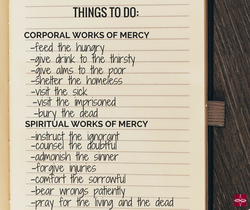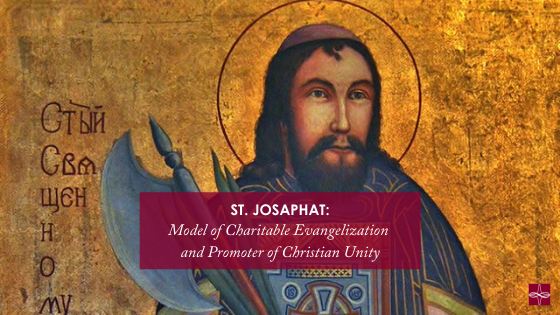|
11/12/2019 St. Josaphat: Model of Charitable Evangelization and Promoter of Christian UnityRead NowToday is the feast day of St. Josaphat, a monk and bishop who was martyred in modern-day Belarus due to his efforts for Christian unity in the 17th century. He was born John Kuncevic to Orthodox Christian parents in the late 1500s in Lithuania. Despite strong anti-Catholic sentiment in the Eastern Orthodox churches, a number of Eastern Catholic bishops signed the Union of Brest in 1598, which allowed several Eastern churches to maintain their liturgical rites while remaining in full communion with Rome. Following the leaders of his Ruthenian Church, John chose to unify himself with Rome and subsequently entered monastic life, taking on the name Josaphat.
As a priest and later a bishop, St. Josaphat worked tirelessly for reunification between the Roman Catholic church and the Eastern Orthodox tradition; he produced apologetics texts and catechisms, published defenses of ecumenism, and reformed the priesthood in his diocese. He struggled against an influential rival Orthodox bishop and schismatic preachers who slandered Josaphat’s reputation and who denounced his desire for Christian unity. Eventually, in the early 1620s, St. Josaphat was attacked by an anti-unification mob, who shot and beheaded him before dumping his body into a nearby river. After his death, many of his former dissidents converted to union with Rome and even Josaphat’s greatest Orthodox rival eventually returned to the authority of the Roman Catholic Church. What struck me when reading about St. Josaphat’s story was the utter breakdown in civil discourse. There were members on either side of the reunification debate who, while they disagreed strongly with one another, were able to do so without coming to blows. But after decades upon decades of increasing tension between the Roman Catholic Church and the Orthodox Christian churches, even a peaceful reformer and ardent defender of unity like St. Josaphat came to be seen by some as an enemy who must be taken down. And there were some whose support of maintaining the schism was so strong that they openly murdered the nearest figurehead of the ecumenical movement. At times like ours, when it feels like there is division and violence all around us, I find it comforting to look at the history of the Church and to see that she has struggled against division almost as long as she has existed. The difficulties that St. Josaphat faced in Eastern Europe were not new to the Church—from the Arian heresy to the Eastern Schism and the Protestant Reformation, Church history is littered with examples of people arguing over the truth, outright rejecting the authority of the magisterium, or spreading misinformation about the Church and her mission. St. Josaphat’s life reminds us of how we are called to evangelize with respect and charity in turbulent—and sometimes violent—times. We must work tirelessly for unity without compromising on the fundamentals of the Catholic faith and the authority of the magisterium, and study and defend the truth in respectful dialogue with those who disagree with us. And we must also prepare, perhaps, to be martyred for our efforts. Most of us will not suffer a violent martyrdom as so many saints before us have done, but there are smaller, everyday crosses that we can endure. When pointing out the truth loses us friendships, that is our little martyrdoms. When we have to wake up in the middle of the night to change yet another diaper, that is our little martyrdom. When someone cuts us off on our way home after a long day, that is our little martyrdom. When a family member misunderstands our intentions, that is our little martyrdom. Like Josaphat, let us rely on God to give us the strength and courage to continue in our everyday mission of evangelization. Every effort matters—even if you never see the fruit it bears—whether you are an archbishop trying to bring Orthodox Christian churches back into unity with Rome or you are a young Catholic trying to demonstrate that an authentic Catholic lifestyle is one of joy and peace. For more resources on Christian Unity, please click here.
0 Comments
“…the Church wants again to state her desire to encounter, accompany, and care for every young person, without exception.” -Pope Francis What is the role of youth and young adults within our Church? How can the Church better listen to their desires, dreams, and needs, and empower them as contributing members of the Body of Christ? What are young people seeking and how can the Church better minister to them during this transformative time in their lives? These are a few of the types of questions asked and discussed at the National Dialogue on Catholic Pastoral Ministry with Youth and Young Adults in Chicago from September 17-19. With representatives from almost fifty Catholic organizations, apostolates, and diocese around the United States, the National Dialogue brought pastoral leaders working with youth and young adults together in order to discuss the future of pastoral ministry to the young church. This dialogue was called for by the United States bishops and co-hosted with the National Federation for Catholic Youth Ministry (NFCYM) and the National Catholic Network de Pastoral Juvenil Hispana (LaRed). The National Dialogue was organized to unify, engage, and mobilize church leaders working with youth and young adults in preparation for the XV Ordinary General Assembly of the Synod of Bishops on “Young People, the Faith, and Vocational Discernment” called for by Pope Francis in Rome in October of 2018, as well as the V Encuentro called for by organizations advocating for Hispanic Ministry. According to their website, “The vision of this initiative is an energized and unified Church committed to forming and engaging youth and young adults as missionary disciples.” The Catholic Apostolate Center was honored to be invited to participate in the National Dialogue this year. As a ministry of the Society of the Catholic Apostolate (Pallottines) - Immaculate Conception Province founded in 2011 to respond to the needs of the church, the Center has worked with and for active young adult Catholics in a variety of ways. Most notably, the Center has developed the ten-week formation program Apostles on Mission in collaboration with the Archdiocese of Washington to help young adults become active evangelizers. As our patron, St. Vincent Pallotti, believed, we are all called to be apostles—what Pope Francis calls missionary disciples. Through efforts such as Apostles on Mission, as well as our online Catholic resources, webinars, podcasts, social media presence and blog, the Catholic Apostolate Center works to revive faith, rekindle charity, and form apostles across all ages and experiences within our Catholic faith. As Pope Francis wrote in the Preparatory Document for the 2018 synod, “Proclaiming the joy of the Gospel is the mission entrusted by the Lord to His Church.” We are excited to see how the collaborative fruits of the National Dialogue help us to fulfill that mission and continue to work to spread the joy of the Gospel each day.  “The Corporal Works of Mercy are found in the teachings of Jesus and give us a model for how we should treat all others, as if they were Christ in disguise.” -United States Conference of Catholic Bishops (USCCB) The above description of the Corporal Works of Mercy reminds us that Christ lives within all of creation, unifying every living being. When we experience this sacred reality, we come to understand our actions as a means by which we may bring healing and wholeness to the Body of Christ. As our Bon Secours Ministry Volunteers practice the Corporal Works of Mercy through their service, they develop a deeper appreciation for the web of relationships which connects each of them in both an intimate and a personal way to all those they meet in their daily lives. In the reflections below, the BSVM volunteers share encounters which illustrate this growth. It is in the act of responding to their neighbor’s hunger and thirst for dignity through the Corporal Works of Mercy that our volunteers meet Christ in service. - Olivia Steback, Program Manager, Bon Secours Volunteer Ministry Feed the Hungry and Give Drink to the Thirsty By Gerard Ondrey When I bring a patient a container of apple juice or a pack of graham crackers, it often doesn’t register in my mind as a significant action. After all, most patients get three meals a day while in the hospital, something many of them do not receive outside the care of Bon Secours Baltimore Hospital. However, during my year of service I have come to realize the importance of these gestures lies not in their magnitude, but in the greater recognition of the human dignity these acts symbolize. The patients I encounter, many of whom struggle with poverty, homelessness, drug addiction, and other afflictions which contribute to their marginalization from mainstream society, are not used to being waited on or served. On the other hand, I am accustomed to going out to restaurants with family or friends, people taking my order, cooking my food, filling up my drink glass, and removing my dishes when I am done. When offering a patient a snack, I don’t quite have the selection of a five-star restaurant to choose from, but when I am asking a question as simple as, “Would you prefer apple, cranberry, or orange juice?” I feel I am embodying the ways in which I have been served. “Waiting” on patients, taking their “orders”, bringing them food, and clearing things away when they are done, feel like true acts of mercy. I am showing them that I find them important by honoring their requests and responding in a full and prompt manner. In my mind, this is what it means to live out the Corporal Works of Mercy of feeding the hungry and giving drink to the thirsty. In the above scenarios, the acts are not important because the people I am serving are in danger of starving to death in that moment, but because of the dynamic they represent; seeing and honoring Christ’s presence in all people elicits the desire to serve. Shelter the Homeless By Alex Yeo Through my ministry in the emergency room I have been able to work with many of the homeless men and women who reside in our community. These individuals come to the hospital seeking medical care and assistance with their social problems. My role, when I first meet them, is to ensure that their non-medical needs are addressed. One of the main organizations the hospital partners with is Healthcare for the Homeless, a nonprofit that provides medical care and social service assistance. With their aid, I have been able to provide patients the support and resources needed to help them transition out of homelessness. Visit the Sick By Mackenzie Buss Our volunteer community has been fortunate enough to avoid sickness so far (thank you Lord!) but, every day at the hospital, we work with those from the greater West Baltimore community who are ill. In my experience, it is often the sickest patients who are the most difficult to 'be present to'. All of our renal patients have a lot going on in their lives, from physical ailments, comorbidities, and actual disability to the myriad social problems that living in an impoverished neighborhood presents. In spite of the massive obstacles that all our patients face, there is still a huge range in energy levels and general overall health. The chipper, friendly, energetic patients are often the easiest to build relationships with. At first, I was daunted by the prospect of talking to the older, quieter, sicker renal patients. As I have grown and learned with Bon Secours Volunteer Ministry this year, I have come to understand that our service isn't necessarily about entertaining patients, solving little problems, or even listening to them. It's about being there for them with your whole soul. That is the mentality that empowered me to smile a bit and sit down next to one of our elderly, quiet, very sick nursing home patients. Sometimes, I'll hold her hand or say something that I am thinking of, but mostly I just sit there beside her. It's really a silent visit, a moment of being present to one of my sisters in Christ in the only way I know how - to just be together. I don't have much else to offer her, but something about those tiny moments, no matter how small and simple, just feels right. It's like a little slice of the Holy Spirit is there in right relationship with us as we sit and simply be together. Visit Prisoners By Elizabeth Modde It is not unusual to pass a man or woman walking down the hallway in handcuffs, flanked by two security guards. Bon Secours Hospital in Baltimore ministers to patients from the Department of Corrections. In fact, some patients admitted to St. Martin's Hall Inpatient Unit will be discharged to the police. Seeing these patients, shackled to their beds, I find myself trying to imagine what they must be feeling. Some are visibly anxious. With a small idea of the dehumanization that can be experienced in prison, I feel privileged to extend warmth and kindness to our prisoners at the hospital. Recognizing basic humanity and dignity, of both patients and the guards in their rooms, can be as simple as smiling and offering a cup of water. Bury the Dead By Alex Yeo In the ER, you rarely get the opportunity to develop a lasting relationship with a patient. There is a very specific process: triage, treat, and either discharge or admit to the inpatient floor. The focus is on efficiency not casual conversation. Regardless, many of the patients that come to the ER frequently are often too intoxicated or incapacitated to engage in conversation. This year, however, I had the privilege of meeting a patient, let us call him David, who had developed a lasting relationship with the ER staff. David, admittedly, was not the most pleasant patient to work with; a homeless alcoholic he had been cycling through the ER for over twenty years. I was always impressed that despite how frustrating it was for the staff to see him constantly return to the hospital, they were able to retain hope for his future. He was always given a place to rest out of the cold, a warm meal, and often times new clothes. The ER staff was his family. Their relationship may have begun begrudgingly but was now one of love and concern. When David passed away this winter, the mood in the ER was one of sadness and relief. Knowing that he had moved on to a better place brought solace to those who had worked with him. Being one of the last people to work with him, I was given the task of organizing his memorial service. Visiting the different departments of the hospital to raise publicity about the service, I was amazed at how many people in the hospital knew of him or had stories about caring for him. The hospital staff had given him many resources and much love, but he also gave back to us. During those difficult and frustrating moments of caring for him, he taught us how to love and to be patient; how to look past one’s impulsive judgments and tap into a deeper desire to care for one another as members of God’s creation. For those lessons we are eternally grateful and his presence will be greatly missed. Give Alms to the Poor By Nicole Odlum Through my ministry, I had the privilege to deliver Christmas gift bags to the many seniors I visit every month for blood pressure screenings. Around Christmastime each year, women from local Baltimore churches donate gift bags filled with simple personal hygiene products, laundry and dish detergent, and hand-knit scarves. For many of the residents, this may be the only Christmas present they receive. When I told them they could keep the entire bag of gifts, the look on their faces was humbling. The gratitude and appreciation they expressed was inspiring; this simple, unexpected gift bag brought them so much joy. One woman actually came back down from her apartment after leaving with her gift bag to thank us again for the things we gave her. That was an extremely powerful moment for me, because I realized how much these simple items, items most people consider a necessity, meant to the seniors. Pope Francis writes that, “Mercy is the force that reawakens us to new life and instills in us the courage to look to the future with hope.” Please continue to remember our volunteers in your prayers as they take Pope Francis’ words to heart and strive to courageously live lives of mercy and hope. To learn more about the Corporal and Spiritual Works of Mercy, click here. This post was originally written and posted on the Catholic Volunteer Network Blog. For more Catholic Volunteer Blog Posts please visit the CVN Blog Page. The Catholic Apostolate Center is proud to partner with the Catholic Volunteer Network by developing faith formation resources for volunteers and alumni, assisting in its efforts to provide and advocate for faith-based volunteerism and collaborate in many additional ways. |
Details
Archives
July 2024
Categories
All
|
About |
Media |
© COPYRIGHT 2024 | ALL RIGHTS RESERVED






 RSS Feed
RSS Feed